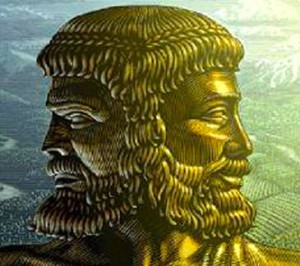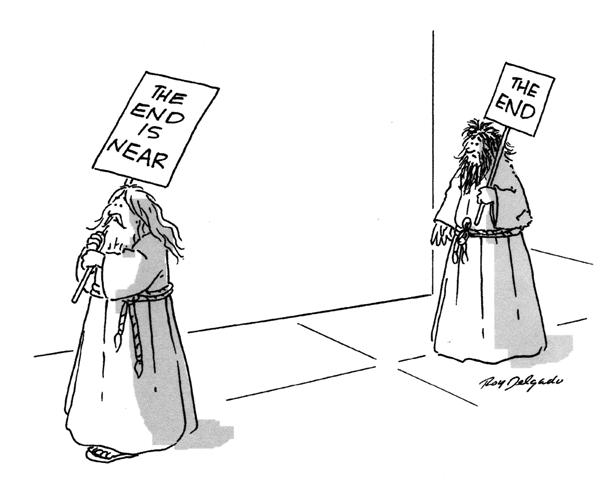Kenneth Burke discusses the immense importance of beginnings and endings as creating the coherent drama of one's life. Similar to a novel or a poem, the ending makes sense because of the beginning and every beginning implies its ending. Oftentimes, there are clues, patterns, and events along one's life that provide insight into its potential endings. Looking back, people want to have their life make sense, justify choices, and being they took the road less traveled. People have always been interested in human origins even to the point of intense controversy and debate. Endings as well, have been of great interest of public concern. It seems, that people are more interested in the far past and the far future, instead of what's right in front of them.
 |
| Looking forward and backward, but not at the present. Retrieved from this blog. |
Creation care members, however, do not often focus on the future. They certainly believe in the apocalypse, but they do not have an established eschatology (or vision of how the world will end) that occupies their time or attention. One respondent noted, "speculations about an apocalyptic war and all the rest of this only detract us from the real issues of the world in which we have been placed by God." Nearly half of respondents discussed the purposeful vagueness of the Bible in leaving out specifics. Many responses referenced Matthew 24:36 which reads "But about about that day or hour no one knows, not even the angels in heaven, nor the Son, only the Father." "That day" references the day of apocalypse, or the day of revelation when the return of Christ will occur. This verse is often used when apocalyptic prophecies are unconfirmed.
 |
| Billboard after Camping's May 21, 2011 predicted rapture did not happen. Retrieved from this blog. |
These respondents noted discomfort in discussing the details of their beliefs. One respondent said, "I don't like to speculate on this. I believe Jesus will return, and He will renew all things. That's all I'm comfortable saying." They all, however, expressed that they had a personal eschatology and were trusting in God to save them. One respondent noted, "I have no idea and Scripture calls on me not to worry or guess when it will end." These responses indicate a shared commitment to the present and an awareness but lack of concern for the future. This appreciation of apocalypse may be in part how creation care members can unite religious belief in (potentially environmental) apocalypse and motivation for action. One respondent argued that thinking about the apocalypse is wasted time: " I'd rather spend my energy trying to make it a better place--a place where life can flourish, rather than focusing on an end that seems unclear."
A few respondents directly linked climate change with the apocalypse. "I do wonder whether climate change will be the physical change to the earth that will usher in Christ's return, simply because it has the potential to make the planet uninhabitable for humans and many other things," said one respondent. Another responded, "I think the climate crisis could end the world as we know it, with life reduced to a much more basic level in various parts of the world, and with great loss of life." A few respondents argued that the Rapture would occur and Christ would judge his followers based on how they treated the world. One noted, "I am committed to the idea that if or when Jesus comes back, there will be plenty of clean power technology around for helping humanity here on earth." This respondent believes in the rapture, but wants to leave the earth in a better environmental condition for those that are left behind.
 |
| Cartoon retrieved from the Huffington Post. |
Creation care members have somehow captured the idea of apocalypse and used it as motivation to act. Not only do they believe that Christ may judge them, but they are also concerned with those who will not be raptured to Heaven. Although belief in apocalypse is often associated with a lack of action or even the welcoming of climate change, creation care members appear to fall in a unique category. As discussed last week, creation care members have found a way to unite science and religion in a modern natural theology. Now, it appears that they have also managed to unite a belief in the apocalypse with an urge to mobilize and act.

No comments:
Post a Comment